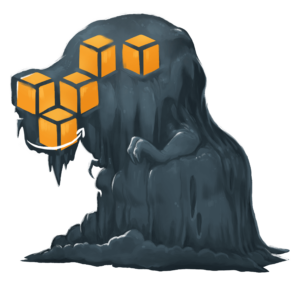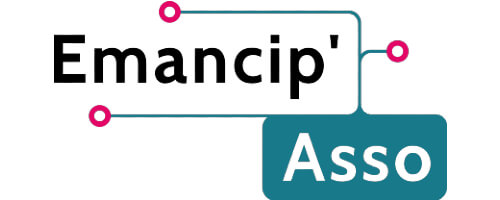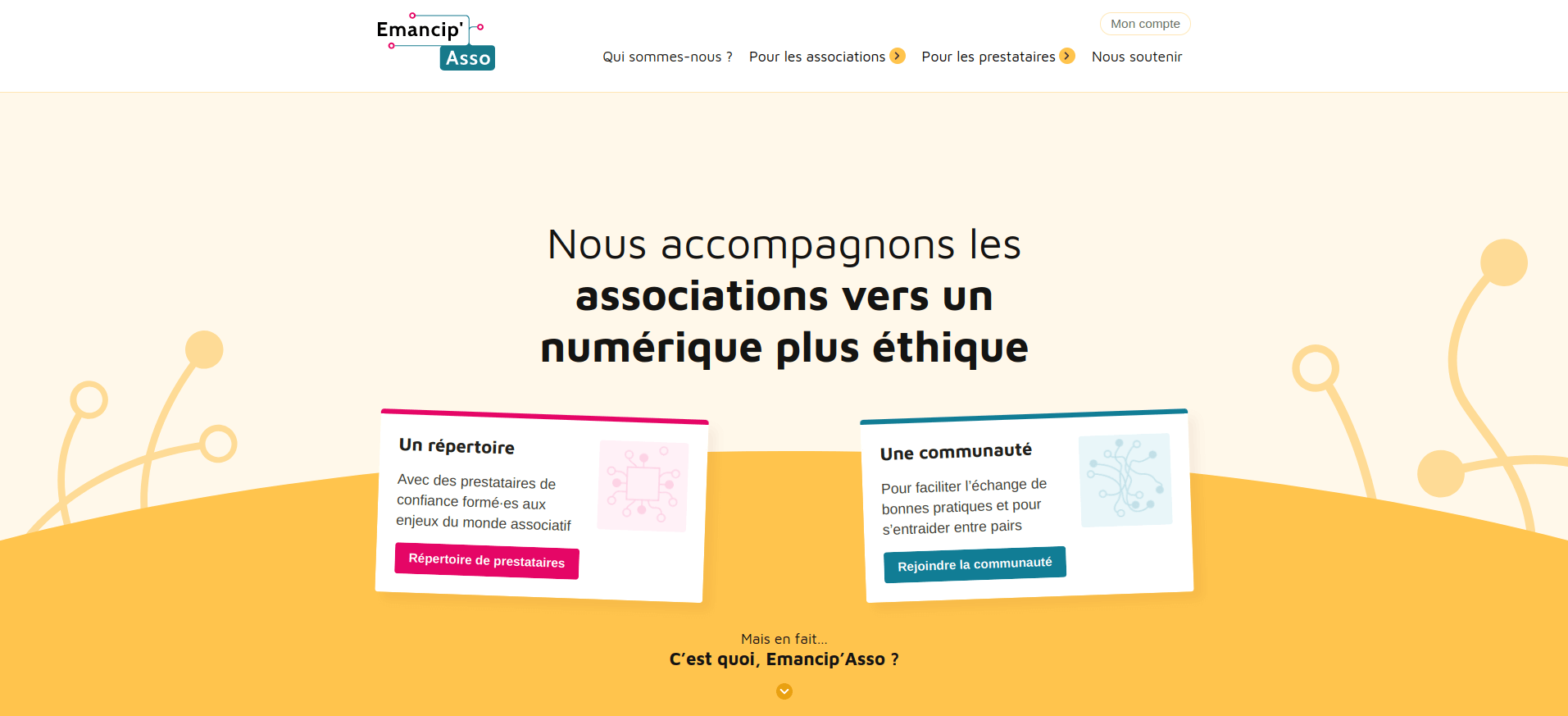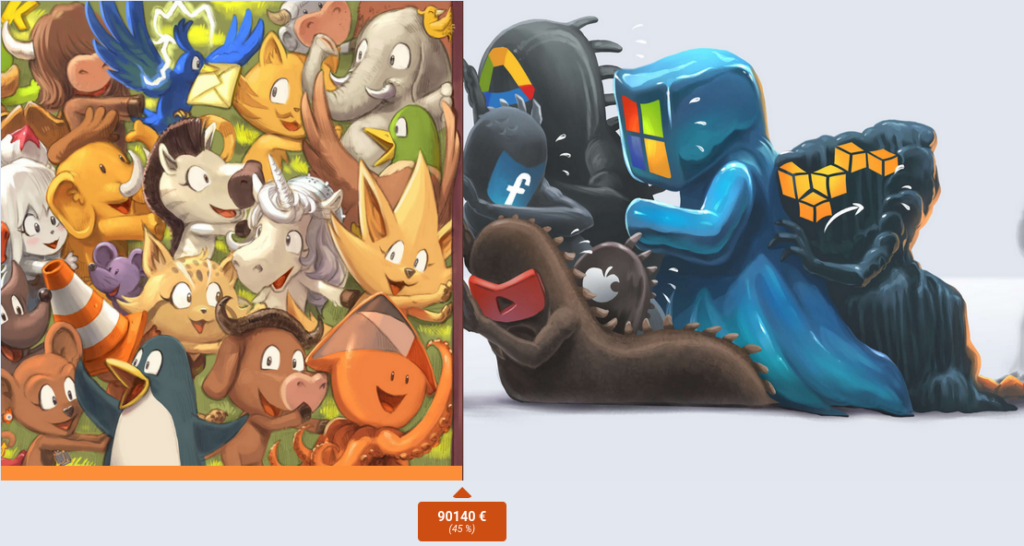Temps de lecture 14 min
Until 2022, the time spent on Emancip’Asso was mainly used to find funding for the project, set up and run a steering committee and organise training for ethical service providers, but it was in 2023 that the project really took off. We’re well on the way to enabling associations that want to free themselves from the digital tools of the web giants to find structures that can support them in this transition.
🦆 VS 😈 : Let’s take back some ground from the tech giants !
Thanks to your donations to our not-for-profit, Framasoft is taking action to advance the ethical, user-friendly web. Find a summary of our progress in 2023 on our Support Framasoft page.
➡️ Read the series of articles from this campaign (Nov. – Dec. 2023)

Emancip’Asso, a 4-part project
Conceived in 2021 in partnership with Animafac, co-piloted by a large number of organisations from the popular education, voluntary and digital sectors, and integrated into our roadmap “Collectivese Internet / Convivialise Internet”, the main objective of the Emancip’Asso project is to bring together ethical digital service providers and voluntary organisations in need of support in their emancipatory digital transition.
In order to achieve its objective, the project will include 4 actions :
- Training for providers of ethical online services ;
- An online course, a digital version of the training ;
- A website listing service providers who specialise in helping associations make the digital transition and providing a place for associations to help each other and share their needs ;
- A major communications campaign to encourage associations to recognise the contradiction of trying to change the world using the tools of capitalism.
It’s been a busy year : the first 3 actions detailed above have now been completed ! We’ll tell you all about them in the rest of this article.
Training suppliers of ethical digital services to support associations
We’ve come to the conclusion that there are very few ethical digital service providers offering solutions that really take into account the needs of voluntary organisations, and in particular the support required to make a successful transition to open source digital tools. The first stage of the Emancip’Asso project therefore aims to support the development of the skills of these actors through two mechanisms : training and an online course (MOOC).
A much-appreciated training course in January 2023
20 people met in Paris from 16 to 20 January at the premises of the FPH (Charles Léopold Mayer Foundation for the Progress of Humanity) to take part in the training course “Developing a range of services to support associations in their ethical digital transition” (in French). Although the original training programme (in French) had to be slightly modified as Thursday 19 January was a day of action against the pension reform, all presentations were able to take place during the week.

Once again, we would like to thank the 9 people who agreed to take part in this training session to share their expertise and exchange views with the participants. Their contributions were much appreciated (see below) and proved invaluable in providing a solid base of knowledge and resources for the production of the MOOC.
We would also like to thank the 20 people who attended the 7 training sessions and took part in the many informal discussions that took place. Our objective of giving priority to alternative hosts who are members of the Collectif des Hébergeurs Alternatifs Transparents Ouverts Neutres et Solidaires (CHATONS) was achieved, as 70 % of the participants are active within an organisation that is a member of the CHATONS collective (14 people), representing a total of 11 structures that are members of the CHATONS collective (Alolise, Assodev-Marsnet, le Cloud Girofle, la Contre-Voie, Deuxfleurs, Immae. eu, Libretic, Nebulae, Pâquerette, Picasoft and Sleto). Of the 6 other participants, one has seen his organisation (FuturEtic) join the CHATONS collective in June 2023 and another (Krashboyz Bordel Klub) is currently applying to join.

The satisfaction questionnaire we sent out to participants highlights the fact that, overall, the week was beneficial for everyone. For example, 35 % of participants found the training very satisfactory, 60 % fairly satisfactory and only one participant found the training fairly unsatisfactory.
The most popular teaching sequences were :
- Carry out a digital diagnosis of an association
- Developing your network and thinking about complementary work
- Communicating and designing a service offer
- User training and support/assistance
- An overview of the digital uses of associations
- Understand the non-profit sector
- Establish a strategic dialogue with the association
(Satisfaction rate calculated on the basis of 5 criteria : quality of theoretical content, quality of practical content, quality of teaching approach, quality of facilitation tools and listening ability/availability).
We also asked participants how satisfied they were with other aspects of the training. And as the graph below shows, overall satisfaction was high, with a few rare exceptions.
However, we recognise that certain aspects could be improved :
- encourage less top-down methods of knowledge transfer,
- providing more practical work and exchange of practice
- improving the coherence between the different interventions
- using more appropriate premises.
And we’ll do our best if we decide to run the course again in the future. But at the moment we don’t have the funding to do so.
A full MOOC in December 2023
It took us almost a year to turn the training into a MOOC, but that’s it : the online course “Developing a range of services to support voluntary organisations in their ethical digital transition” is now available on the CHATONS MOOC platform (only in French, sorry !). Mind you, the paint is still fresh and there are bound to be a few typos, but this online course, which is primarily aimed at organisations and individuals who already provide online services or who want to offer them to associations, will enable you to acquire a methodology and support techniques that go far beyond simply providing services.
The CHATONS #2 MOOC is broadly based on the educational sequence of the training course and allows you to navigate as you wish within 8 major themes, each of which offers several lessons and an MCQ (for self-assessment of acquired knowledge). Each lesson is structured around illustrated textual content and sometimes includes activities for you to complete. While we do not aim to be exhaustive, we have tried to summarise the state of knowledge on each topic and systematically include a ‘further reading’ section so that anyone wishing to delve deeper into the subject can consult additional resources.

The course is now open and anyone can join whenever they like : there’s no registration period to keep to. In fact, you don’t even need to register to view the lessons. However, we recommend that you create an account to take advantage of advanced features :
- Access to self-assessment exercises in the form of multiple choice questions ;
- Access to the self-help forum
- Track your progress through the course (so you can pick up a lesson where you left off, or keep track of your assessment results).
The key word here is autonomy. We want to give learners as much freedom as possible in their learning path : everyone can follow the lessons at their own pace and manage the time they devote to this MOOC.
As usual with Framasoft, all content created for this MOOC is released under a free CC-By-SA licence (some images and videos from third party sites are marked as such). We hope that it will evolve, especially thanks to the contributions and feedback on the support forum. This MOOC should therefore be seen as an organic, living community : it will grow if we take care of it. If there are missing resources, if an activity is off the mark, if a lesson is too long, we invite you to share your opinion and suggest improvements on the support forum.
A website to help associations get in touch with service providers, but that’s not all…
The first objective of the Emancip’Asso project was to enable ethical online service providers to develop their skills in supporting associations, but the second was to create an online space where associations could identify them. That’s why, right from the start of the project, we planned to create a website to bring people together. But before we could start creating the site, we had to create a graphic identity for Emancip’Asso.
A graphic identity and design 👌
In September 2022, we asked a group of students to work on the creation of the graphic charter and visual identity for the Emancip’Asso project, as part of the supervised projects within the Colibre pro degree. After an initial phase in which the project was presented and our brief explained, 4 students⋅es carried out a comparison of the graphic charters/visual identities of ‘neighbouring’ projects before drawing up a set of specifications presenting their analysis of the needs, from which they each developed a proposal for the graphic charter. One of these proposals met our expectations and served as the inspiration for our service provider, Thomas Nicolas (thanks to him), to create the logo.

At the same time, we responded to a call for projects from the Latitudes association, which each year offers to help organisations with a committed digital project to bring it to fruition through a tutoring programme with students from their partner schools. Between October 2022 and January 2023, three second-year students from the CentraleSupélec engineering school worked on a prototype of the future website. After learning about the project, they thought about the tree structure of the future website and the functionalities to be offered on each page, before creating mock-ups using the Penpot tool. These mock-ups were then used by our service provider, the Coopérative des Internets, to build the site.
The graphic identity and design of emancipasso.org is the result of the work of many people, and we’re pretty damn proud of it.

A directory of service providers, a community and resources
The emancipasso.org website, created by La Coopérative des Internets (thanks to them !), is divided into 3 sections.
The first is a directory of service providers able to support associations wishing to make the transition to open source digital tools.
By “support”, we mean accompanying the association through all the stages necessary for its transition (co-development of a digital strategy, diagnosis and recommendations, implementation of these recommendations and assistance in getting to grips with the solutions deployed). We found that associations often had difficulty finding professionals who could provide this type of tailored support. Like many organisations, not-for-profits think in terms of ‘tools’ first, before thinking about a digital strategy to ensure a smooth transition (without having to return to the services of the web giants after a few months because they haven’t thought through all the aspects of this transition). For this reason, associations will not find in this directory providers who only offer technical solutions. In fact, we have systematically asked service providers who have volunteered to be included in this directory to prove that they have already carried out several projects to support associations.

So far, 20 service providers are listed in this directory. That’s a start. Over the past month, we have been actively communicating with support professionals about the existence of this site. What’s more, we’re expecting service providers who have taken the training or the MOOC to register in the next few months. So it’s still a work in progress and you can access it. If you know of people or organisations that could be listed, please let us know.
The emancipasso.org website is also intended to be a gateway to a community where associations and other players in the emancipatory digital ecosystem can help and advise each other, share best practices and communicate their needs in terms of tools and/or functionalities so that development costs can be shared between several organisations. Based on the observation that associations, and in particular the people in charge of the digital aspects within them, currently have very few forums in which to discuss their practices in relation to the digital transition (thanks, incidentally, to the Mouvement Associatif and its regional delegations, which regularly address this issue), we felt it was essential to offer a space where they could feel less isolated on these issues.
Finally, the Resources section offers a selection of content aimed at voluntary organisations, so that they can familiarise themselves with ethical digital technology, but also at service providers, so that they can improve their knowledge of the voluntary sector and their methods of support. Our aim here is to list as much educational content as possible to promote the emancipation of the voluntary sector. If you have resources that we have not identified, please let us know (by sending a message to contact(at)emancipasso(dot)org) so that we can add them.
What about 2024 ?
In the coming weeks and months we will continue to work on the MOOC “Developing a range of services to support associations in their ethical digital transition” to correct what still needs to be corrected, improve certain content and add video sequences from the recording of the training session.
We will also continue to invite service providers to join the Emancip’Asso directory and to process applications. It’s a long-term task to identify all the existing structures and ensure that they really offer services to associations that include a support dimension. Throughout the year, we will try to be present at the main gatherings of ethical and responsible digital professionals to inform them about the scheme and encourage them to join.

But the biggest task will be to carry out the fourth stage of the project : to make associations aware of the incoherence of trying to change the world using the tools of capitalism and to encourage them to go to emancipasso.org to find resources, peer support and service providers to help them in their transition. To do this, we plan to launch a targeted communications campaign throughout March 2024. We are currently working on this and hope you will help us by sharing our communication materials with your favourite associations ! And throughout the year, we will be presenting the project at the main events that bring together the voluntary sector (Forum national de l’ESS, Universités d’été du Mouvement Associatif, Forum national des associations, etc.) to raise awareness.
Finally, once the associations are aware of the project and have joined the Emancip’Asso community, we will put more energy into animating this community in order to facilitate exchanges between participants. Our goal is for the Emancip’Asso community to become an essential space for all associations in transition or that have completed their digital transition, and for frequent visits to this community to become an integral part of associative practices.
Thank you for supporting Emancip’Asso and Framasoft
Although the costs of the Emancip’Asso project have so far been covered by the Fondation Charles Léopold Mayer pour le Progrès de l’Homme (FPH), the Fondation Crédit Coopératif and the Fondation Un monde par tous, we no longer have any external sources of funding for the rest of the project.
So if you like this project and if it’s possible for you, we encourage you to support Framasoft. A part of your donations will help us to finance the costs (communication campaign and project coordination) of the Emancip’Asso project in 2024.
Once again this year, we need you, your support, your sharing to help us regain ground on the toxic GAFAM web and multiply the number of ethical digital spaces.
So we’ve asked David Revoy to help us present this on our « Support Framasoft » page, which we invite you to visit (because it’s beautiful) and above all to share as widely as possible :
If we are to balance our budget for 2024, we have just 12 days left to raise € 109000 : we can’t do it without your help !

